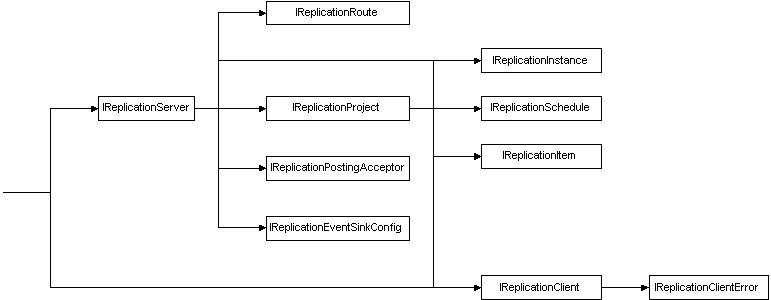



To program Content Deployment, you must first create either a ReplicationServer object or a ReplicationClient object. You use the ReplicationClient object to replicate a few files, and the ReplicationServer object to replicate all the files.
For example, suppose your corporation has a Human Resources Web site with links to many files and graphics. You decide to add a Web page to display the company's current stock price. You add a link and graphic to the main HR Web page and create a new subdirectory to hold the stock price Web page and its graphics. Because you don't want to create a new project for just these new additions and changes, you use the ReplicationClient object.
If you make so many changes to the entire HR Web site that you have trouble remembering which files have changed or you just want to make sure you update everything, you use the ReplicationServer object to open a ReplicationProject object that you can use to replicate the full HR Web site to your other corporate Web servers.
Use the ReplicationProject object to specify the project type, perform rollbacks, change deployment and destination locations, set up access control lists (ACL), and perform other administrative tasks. The ReplicationSchedule object provides flexible replication scheduling to the hour and minute.
The ReplicationInstance and ReplicationItem objects give information on the replicationís status, results, and items. The ReplicationRoute object deploys copies of required projects on the participating servers; and the ReplicationPostingAcceptor object provides control over replication delivery on the destination servers.
The Content Deployment object model, except for the SiteServerEvent and SiteServerEventSink objects (you provide the source for the SiteServerEventSink object, if you want to receive information about events), is shown in the following illustration:

The Content Deployment objects are summarized alphabetically in the following table:
| Object | Description |
| ReplicationClient | Replicates individual files without the Content Deployment server. |
| ReplicationClientError | Provides ReplicationClient error information. |
| ReplicationEventSinkConfig | Defines the configuration of an event sink. |
| ReplicationInstance | Provides information about individual replications. |
| ReplicationItem | Provides access to individual replication items in a project. |
| ReplicationPostingAcceptor | Provides access to access Posting Acceptor properties. |
| ReplicationProject | Provides methods and properties to administer projects. |
| ReplicationRoute | Provides methods and properties to administer replication routes. |
| ReplicationSchedule | Provides access to the schedule of when and how often replications are run. |
| ReplicationServer | Provides methods and properties to administer the Content Deployment server. |
| SiteServerEvent | Provides methods and properties to administer events. |
| SiteServerEventSink | You provide this object if you want Content Deployment to notify your application when an event occurs. |